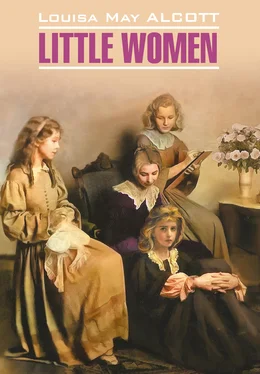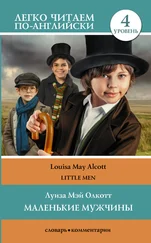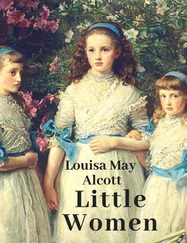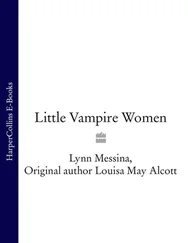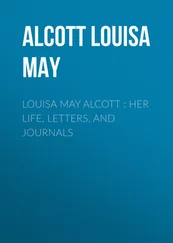No gentleman were admitted, so Jo played male parts to her heart’s content and took immense satisfaction in a pair of russet leather boots given her by a friend, who knew a lady who knew an actor. These boots, an old foil, and a slashed doublet once used by an artist for some picture, were Jo’s chief treasures and appeared on all occasions. The smallness of the company made it necessary for the two principal actors to take several parts apiece, and they certainly deserved some credit for the hard work they did in learning three or four different parts, whisking in and out of various costumes, and managing the stage besides. It was excellent drill for their memories, a harmless amusement, and employed many hours which otherwise would have been idle, lonely, or spent in less profitable society.
On Christmas night, a dozen girls piled onto the bed which was the dress circle, and sat before the blue and yellow chintz curtains in a most flattering state of expectancy. There was a good deal of rustling and whispering behind the curtain, a trifle of lamp smoke, and an occasional giggle from Amy, who was apt to get hysterical in the excitement of the moment. Presently a bell sounded, the curtains flew apart, and the operatic tragedy began.
“A gloomy wood,” according to the one playbill, was represented by a few shrubs in pots, green baize on the floor, and a cave in the distance. This cave was made with a clothes horse for a roof, bureaus for walls, and in it was a small furnace in full blast, with a black pot on it and an old witch bending over it. The stage was dark and the glow of the furnace had a fine effect, especially as real steam issued from the kettle when the witch took off the cover. A moment was allowed for the first thrill to subside, then Hugo, the villain, stalked in with a clanking sword at his side, a slouching hat, black beard, mysterious cloak, and the boots. After pacing to and fro in much agitation, he struck his forehead, and burst out in a wild strain, singing of his hatred for Roderigo, his love for Zara, and his pleasing resolution to kill the one and win the other. The gruff tones of Hugo’s voice, with an occasional shout when his feelings overcame him, were very impressive, and the audience applauded the moment he paused for breath. Bowing with the air of one accustomed to public praise, he stole to the cavern and ordered Hagar to come forth with a commanding, “What ho, minion! I need thee!”
Out came Meg, with gray horsehair hanging about her face, a red and black robe, a staff, and cabalistic signs upon her cloak. Hugo demanded a potion to make Zara adore him, and one to destroy Roderigo. Hagar, in a fine dramatic melody, promised both, and proceeded to call up the spirit who would bring the love philter.
Hither, hither, from thy home,
Airy sprite,
I bid thee come!
Born of roses, fed on dew,
Charms and potions canst thou brew?
Bring me here, with elfin speed,
The fragrant philter which I need.
Make it sweet and swift and strong,
Spirit, answer now my song!
A soft strain of music sounded, and then at the back of the cave appeared a little figure in cloudy white, with glittering wings, golden hair, and a garland of roses on its head. Waving a wand, it sang…
Hither I come,
From my airy home,
Afar in the silver moon.
Take the magic spell,
And use it well,
Or its power will vanish soon!
And dropping a small, gilded bottle at the witch’s feet, the spirit vanished. Another chant from Hagar produced another apparition, not a lovely one, for with a bang an ugly black imp appeared and, having croaked a reply, tossed a dark bottle at Hugo and disappeared with a mocking laugh. Having warbled his thanks and put the potions in his boots, Hugo departed, and Hagar informed the audience that as he had killed a few of her friends in times past, she had cursed him, and intends to thwart his plans, and be revenged on him. Then the curtain fell, and the audience reposed and ate candy while discussing the merits of the play.
A good deal of hammering went on before the curtain rose again, but when it became evident what a masterpiece of stage carpentery had been got up, no one murmured at the delay. It was truly superb. A tower rose to the ceiling, halfway up appeared a window with a lamp burning in it, and behind the white curtain appeared Zara in a lovely blue and silver dress, waiting for Roderigo. He came in gorgeous array, with plumed cap, red cloak, chestnut lovelocks, a guitar, and the boots, of course. Kneeling at the foot of the tower, he sang a serenade in melting tones. Zara replied and, after a musical dialogue, consented to fly. Then came the grand effect of the play. Roderigo produced a rope ladder, with five steps to it, threw up one end, and invited Zara to descend. Timidly she crept from her lattice, put her hand on Roderigo’s shoulder, and was about to leap gracefully down when “Alas! Alas for Zara!” she forgot her train. It caught in the window, the tower tottered, leaned forward, fell with a crash, and buried the unhappy lovers in the ruins.
A universal shriek arose as the russet boots waved wildly from the wreck and a golden head emerged, exclaiming, “I told you so! I told you so!” With wonderful presence of mind, Don Pedro, the cruel sire, rushed in, dragged out his daughter, with a hasty aside…
“Don’t laugh! Act as if it was all right!” and, ordering Roderigo up, banished him from the kingdom with wrath and scorn. Though decidedly shaken by the fall from the tower upon him, Roderigo defied the old gentleman and refused to stir. This dauntless example fired Zara. She also defied her sire, and he ordered them both to the deepest dungeons of the castle. A stout little retainer came in with chains and led them away, looking very much frightened and evidently forgetting the speech he ought to have made.
Act third was the castle hall, and here Hagar appeared, having come to free the lovers and finish Hugo. She hears him coming and hides, sees him put the potions into two cups of wine and bid the timid little servant, “Bear them to the captives in their cells, and tell them I shall come anon.” The servant takes Hugo aside to tell him something, and Hagar changes the cups for two others which are harmless. Ferdinando, the ‘minion’, carries them away, and Hagar puts back the cup which holds the poison meant for Roderigo. Hugo, getting thirsty after a long warble, drinks it, loses his wits, and after a good deal of clutching and stamping, falls flat and dies, while Hagar informs him what she has done in a song of exquisite power and melody.
This was a truly thrilling scene, though some persons might have thought that the sudden tumbling down of a quantity of long red hair rather marred the effect of the villain’s death. He was called before the curtain, and with great propriety appeared, leading Hagar, whose singing was considered more wonderful than all the rest of the performance put together.
Act fourth displayed the despairing Roderigo on the point of stabbing himself because he has been told that Zara has deserted him. Just as the dagger is at his heart, a lovely song is sung under his window, informing him that Zara is true but in danger, and he can save her if he will. A key is thrown in, which unlocks the door, and in a spasm of rapture he tears off his chains and rushes away to find and rescue his lady love.
Act fifth opened with a stormy scene between Zara and Don Pedro. He wishes her to go into a convent, but she won’t hear of it, and after a touching appeal, is about to faint when Roderigo dashes in and demands her hand. Don Pedro refuses, because he is not rich. They shout and gesticulate tremendously but cannot agree, and Rodrigo is about to bear away the exhausted Zara, when the timid servant enters with a letter and a bag from Hagar, who has mysteriously disappeared. The latter informs the party that she bequeaths untold wealth to the young pair and an awful doom to Don Pedro, if he doesn’t make them happy. The bag is opened, and several quarts of tin money shower down upon the stage till it is quite glorified with the glitter. This entirely softens the stern sire. He consents without a murmur, all join in a joyful chorus, and the curtain falls upon the lovers kneeling to receive Don Pedro’s blessing in attitudes of the most romantic grace.
Читать дальше
